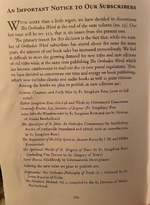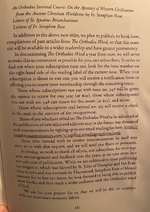This letter Rose wrote to Thomas Merton is a masterpiece. It explains the Orthodox mindset and the heart of Orthodoxy, about "the one thing needful." And he contrasts it with the social and moralistic emphasis of much of Catholicism and Protestantism. Christianity is not about moralism, and it is not about "saving the world". The "social gospel" is an ideology and an idol and it is not at the heart of Christianity.
Amazing to think that Rose penned this as a new convert at the age of 28.
An extended quote from the key section, but the letter is worth reading in its entirety.
I have, before this, been reproached by Catholics for lack of interest in the social mission of the Church, for holding to a one-sided "ascetic" and "apocalyptic" Christianity; and some Catholic philosophers and theologians have made such accusations against the Orthodox Church itself—accompanied, sometimes, if I am not mistaken, by a somewhat patronizing tone that assumes the Church is rather "backward" or "out-of-date" about such things, having always been "repressed" by the State and used to looking at the world through the all-too-unworldly eyes of the monk. Far be it from me to presume to speak for the Church; but I can at least speak of some of the things I think I have learned from Her.
You may legitimately ask me what, if I am skeptical of "social Christianity "—though of course I do not wish it abolished or given to the devil, I am merely pointing out its ambivalence—what I advocate as "Christian action" in the midst of the "crisis" of the age with its urgent alternatives.
First and foremost I radically question the emphasis upon "action" itself, upon "projects" and "planning," upon concern with the "social" and what man can do about it—all of which acts to the detriment of acceptance of the given, of what God gives us at this moment, as well as of allowing His will to be done, not ours. I do not propose a total withdrawal from politics and social work by all Christians; no arbitrary rule can govern that, it is up to the individual conscience. But in any case, if many may still be called to work for "justice," "peace," "unity," "brotherhood" in the world—and these are all, in this generalized, ideal form, external and worldly goals—is it not at least as good a thing to be called to the totally unequivocal work of the Kingdom, to challenge all worldly ideals and preach the only needful Gospel: repent, for the Kingdom is at hand? You yourself quite rightly say of America and Russia, "the enemy is not just on one side or the other.... The enemy is on both sides." Is it not possible to deepen this perception and apply it to those other seemingly ultimate alternatives, "war" and "peace"? Is one really any more possible for a Christian than the other, if the "peace" is a "total (i.e. idealistic) peace"? And does not the recognition of these two equally unacceptable alternatives lead us back to a genuine "third way"—one that will never be popular because it is not "new," not "modern," above all not "idealistic "—a Christianity that has as its end neither worldly "peace" nor "war," but a Kingdom not of this world?
This is nothing "new," as you say, and a world that imagines itself "post-Christian" is tired of it. It is true that when we, as Christians, speak to our brothers we often seem to be faced with a blank wall of unwillingness even to listen; and, being human, we may be made somewhat "desperate" by this lack of response. But what can be done about this? Shall we give up speaking about what our contemporaries do not want to hear, and join them in the pursuit of social goals which, since they are not specifically Christian, can be sought by non-Christians too? That seems to me an abdication of our responsibility as Christians. I think the central need of our time is not in the least different from what it has always been since Christ came; it lies, not in the area of "political commitments" and "social responsibilities," but precisely in "prayer and penance" and fasting and preaching of the true Kingdom. The only "social responsibility" of a Christian is to live, wherever and with whomever he may be, the life of faith, for his own salvation and as an example to others. If, in so doing, we help to ameliorate or abolish a social evil, that is a good thing—but that is not our goal. If we become desperate when our life and our words fail to convert others to the true Kingdom, that comes from lack of faith. If we would live our faith more deeply, we would need to speak of it less.
You speak of the necessity, not just to speak the truth of Christianity, but "to embody Christian truth in action." To me, this means precisely the life I have just described, a life infused with faith in Christ and hope in His Kingdom not of this world. But the life you seem to describe is one very much involved in the things of this world; I cannot help but regard it as an "outward" adaptation of true Christian inwardness.
Modern idealism, which is devoted to the realization of the idolatrous "Kingdom of Man," has long been making its influence felt in Christian circles; but only in quite recent years has this influence begun to bear real fruit within the womb of the Church itself. I think there can be no question but that we are witnessing the birth pangs of something that, to the true Christian, is indeed pregnant with frightful possibilities: a "new Christianity," a Christianity that claims to be "inward," but is entirely too concerned with outward result; a Christianity, even, that cannot really believe in "peace" and "brotherhood" unless it sees them generalized and universally applied, not in some seemingly remote "other world," but "here and now." This kind of Christianity says that "private virtue" is not enough—obviously relying on a Protestantized understanding of virtue, since everything the true Christian does is felt by all in the Mystical Body; nothing done in Christ is done for oneself alone—but not enough for what? The answer to that, I think, is clear: for the transformation of the world, the definitive "realization" of Christianity in the social and political order. And this is idolatry. The Kingdom is not of this world; to think or hope that Christianity can be outwardly "successful" in the world is a denial of all that Christ and His prophets have said of the future of the Church. Christianity can be "successful" on one condition: that of renouncing (or conveniently forgetting) the true Kingdom and seeking to build up a Kingdom in the world. The "Earthly Kingdom" is precisely the goal of the modern mentality; the building of it is the meaning of the modern age. It is not Christian; as Christians, we know whose Kingdom it is. And what so greatly troubles me is that today Christians—Catholic and Orthodox alike—are themselves joining, often quite unaware of the fact, often with the best possible intentions, in the building of this new Babel.



